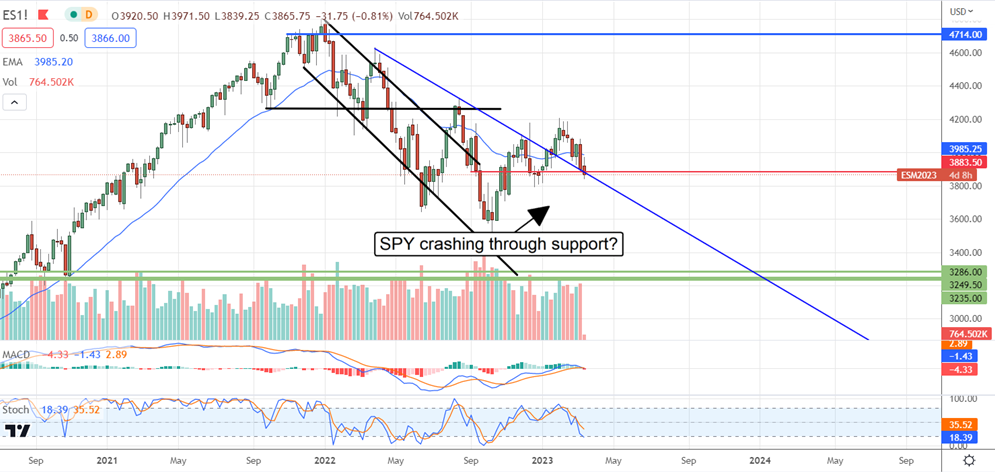SVB: The First Crack in the Economy, Pressure Building
2023.03.14 06:09
- The collapse of SVB is just the beginning of the next great financial crisis.
- Contagion is spreading, and banks are moving lower, bringing the broad market down with it.
- The S&P 500 could fall 500 points or more before it hits bottom again.
If you’ve been watching the march of inflation and the Fed’s attempts to curb it and have been wondering when this economy will crack, it did. Last week not one but 2 major financial institutions were closed by the feds to curb fallout from FOMC actions. The short story is that Silicon Valley Bank needed to raise some capital, nothing major, just $2.5 billion, as its balance sheet was underfunded. The reason is a shift in interest rates that left the tech-focused bank unable to sell its bond assets. A simple call to raise said capital led to a run on the bank worth $42 billion and sparked what looks like the next great financial crisis.
Contagion Spreading: First Republic In The Crosshairs
And the contagion is not contained. At least 2 other banks are caught up in the financial tidal of wave of rising interest rates, including Silvergate Bank and Signature Bank (NASDAQ:). These 2 crypto-focused firms also found themselves underfunded and unable to raise capital even through outright selling the businesses. This has led to yet another government bailout of the banking industry, and will likely be more closings in the coming days and weeks.
The Fed’s new buzzword is the Bank Term Funding Program, a new lending facility that aims to shore up troubled institutions. Banks will have access to short-term 1-year loans the U.S. Treasury is back-stopping with up to $25 billion. This won’t be the last; TARP was the first of several relief programs enacted after the Housing Bubble burst.
San Francisco-based First Republic Bank (NYSE:) is in the crosshairs now. This tech-focused institution is down more than 60% in premarket trading despite funding from JPMorgan. JPMorgan Chase (NYSE:) helped shore up the balance sheet to over $70 billion in excess liquidity on top of what is available through the Federal Reserve. This should have the bank amply capitalized, but there is still fear a massive outflow of cash will put this company back on the brink. The news has the entire banking sector down, with names like JPMorgan and Bank of America (NYSE:) down about 2.0% and other, riskier names down double-digits. Financial Select Sector SPDR® Fund (NYSE:) is down nearly 3.0% in pre-market trading and confirming a top and reversal in the sector.
Inflation And FOMC Are Still A Risk
The market has begun to price in a more lenient FOMC now that cracks are appearing in the economy, but there is risk in this outlook. The following consumer inflation report is due this week and will be a market-moving event. The analysts expect inflation to be steady month-to-month at the headline and core level and for YOY comps to decelerate. This is the same forecast they gave for the last PCE Price Index, and that report came in hot on all counts, confirming the reacceleration of inflation. If the same is true of the CPI data, the FOMC will have no choice but to continue raising rates until inflation cools. The committed needs to be sure inflation is tamed, and Mr. Powell’s latest indications were that 50 basis points were back on the table. The next FOMC meeting is next week.
S&P 500 Headed Back To Support: 3,500 In The Sights
The S&P 500 wobbled in an extensive range in overnight trading Sunday but fell as the market got to work on Monday morning. The index is indicated down about 2.0%, which is a move that confirms signals given the previous week. Those signals include confirming resistance and a downtrend that could take the market to 3,500 or lower. Even if the banking system is back-stopped, we can expect VC and business investment to come to a grinding halt, job growth to slow or reverse, and consumer spending to tank. This is going to accelerate the downward trend in EPS consensus figures, and that will bring the market down. The risk now is that S&P 500 action will set a new low, bringing the 3,200-3,300 range into play.

Original Post








